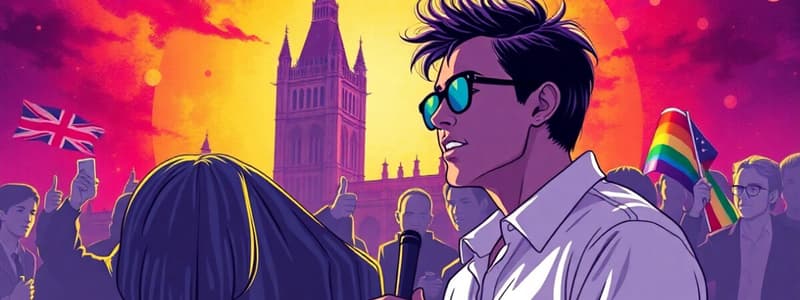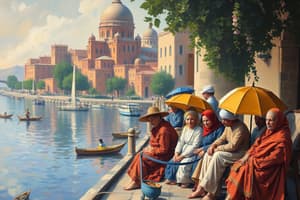Podcast
Questions and Answers
What was the main goal of the "Don't Ask, Don't Tell" policy?
What was the main goal of the "Don't Ask, Don't Tell" policy?
Which of the following is NOT a term used to describe a person who does not identify as male or female?
Which of the following is NOT a term used to describe a person who does not identify as male or female?
What was the significance of the Obergefell v. Hodges Supreme Court decision?
What was the significance of the Obergefell v. Hodges Supreme Court decision?
What is the term for a person who supports the rights of LGBTQIA+ individuals, even if they are not part of the community?
What is the term for a person who supports the rights of LGBTQIA+ individuals, even if they are not part of the community?
Signup and view all the answers
Which of the following is NOT an example of LGBTQIA+ activism?
Which of the following is NOT an example of LGBTQIA+ activism?
Signup and view all the answers
What is the main purpose of the separation of powers?
What is the main purpose of the separation of powers?
Signup and view all the answers
Which of these are examples of social categorizations that create overlapping systems of discrimination or privilege?
Which of these are examples of social categorizations that create overlapping systems of discrimination or privilege?
Signup and view all the answers
Which of these is NOT a role of the Prime Minister in the UK government?
Which of these is NOT a role of the Prime Minister in the UK government?
Signup and view all the answers
What does the term 'queer' encompass?
What does the term 'queer' encompass?
Signup and view all the answers
How do checks and balances work?
How do checks and balances work?
Signup and view all the answers
Which of the following describes a person whose gender identity shifts between different genders?
Which of the following describes a person whose gender identity shifts between different genders?
Signup and view all the answers
Which political party is considered the Official Opposition in the UK?
Which political party is considered the Official Opposition in the UK?
Signup and view all the answers
What does federalism mean?
What does federalism mean?
Signup and view all the answers
Which of the following is NOT an enumerated power of the federal government?
Which of the following is NOT an enumerated power of the federal government?
Signup and view all the answers
What is the primary function of Select Committees in the UK government?
What is the primary function of Select Committees in the UK government?
Signup and view all the answers
Which of the following is an example of a check on the power of the legislative branch?
Which of the following is an example of a check on the power of the legislative branch?
Signup and view all the answers
Which of these is a key characteristic of the Conservative Party?
Which of these is a key characteristic of the Conservative Party?
Signup and view all the answers
What is the purpose of the Bill of Rights?
What is the purpose of the Bill of Rights?
Signup and view all the answers
What is the purpose of Prime Minister's Questions (PMQs)?
What is the purpose of Prime Minister's Questions (PMQs)?
Signup and view all the answers
Which branch of government is responsible for making laws?
Which branch of government is responsible for making laws?
Signup and view all the answers
What is the main purpose of the judicial branch?
What is the main purpose of the judicial branch?
Signup and view all the answers
Which of these options are correct about the official opposition? (Select all that apply.)
Which of these options are correct about the official opposition? (Select all that apply.)
Signup and view all the answers
Which of these options are correct about the government's structure? (Select all that apply.)
Which of these options are correct about the government's structure? (Select all that apply.)
Signup and view all the answers
Which of these options are true about the House of Lords? (Select all that apply.)
Which of these options are true about the House of Lords? (Select all that apply.)
Signup and view all the answers
What is the role of Select Committees in the UK political structure?
What is the role of Select Committees in the UK political structure?
Signup and view all the answers
Which of the following describes the 'first past the post' electoral system used in the UK?
Which of the following describes the 'first past the post' electoral system used in the UK?
Signup and view all the answers
What is the role of the Speaker in the House of Commons?
What is the role of the Speaker in the House of Commons?
Signup and view all the answers
Which of these options are correct about the Sovereign? (Select all that apply.)
Which of these options are correct about the Sovereign? (Select all that apply.)
Signup and view all the answers
Which of the following is NOT a function of Parliament?
Which of the following is NOT a function of Parliament?
Signup and view all the answers
Which of the following best describes the relationship between the House of Lords and the House of Commons?
Which of the following best describes the relationship between the House of Lords and the House of Commons?
Signup and view all the answers
What is the maximum duration of a Parliament in the UK?
What is the maximum duration of a Parliament in the UK?
Signup and view all the answers
What is the current tuition fee for students in England?
What is the current tuition fee for students in England?
Signup and view all the answers
What is the threshold salary for students to start paying back their maintenance loan in England?
What is the threshold salary for students to start paying back their maintenance loan in England?
Signup and view all the answers
What percentage of students in England will never be able to pay back their student loan in full?
What percentage of students in England will never be able to pay back their student loan in full?
Signup and view all the answers
What is the main characteristic of the Open University?
What is the main characteristic of the Open University?
Signup and view all the answers
Which of the following is NOT a form of further and adult education?
Which of the following is NOT a form of further and adult education?
Signup and view all the answers
What is the minimum age for compulsory education in the UK?
What is the minimum age for compulsory education in the UK?
Signup and view all the answers
Which of the following is NOT a type of UK school?
Which of the following is NOT a type of UK school?
Signup and view all the answers
What is the primary purpose of 'Key Stage 4' education?
What is the primary purpose of 'Key Stage 4' education?
Signup and view all the answers
Which of the following is not a key aspect of the early years education system in the UK?
Which of the following is not a key aspect of the early years education system in the UK?
Signup and view all the answers
Which of the following examinations is taken by students at the end of Key Stage 2?
Which of the following examinations is taken by students at the end of Key Stage 2?
Signup and view all the answers
Which of the following statements best describes the differences between Comprehensive Schools and Faith Schools in the UK?
Which of the following statements best describes the differences between Comprehensive Schools and Faith Schools in the UK?
Signup and view all the answers
Which of these accurately reflects the typical school structure in the UK?
Which of these accurately reflects the typical school structure in the UK?
Signup and view all the answers
What is a characteristic of the 'Key Stage 3' curriculum?
What is a characteristic of the 'Key Stage 3' curriculum?
Signup and view all the answers
Signup and view all the answers
Flashcards
Maintenance Loan Repayment
Maintenance Loan Repayment
Students repay loans after graduation when earning over £25,000.
Loan Write-off Policy
Loan Write-off Policy
Loans not fully repaid are cancelled after 30 years.
Open University (OU)
Open University (OU)
A distance learning university established in 1969 for adult education.
Further Education Types
Further Education Types
Signup and view all the flashcards
Lifelong Learning Providers
Lifelong Learning Providers
Signup and view all the flashcards
Don't Ask, Don't Tell
Don't Ask, Don't Tell
Signup and view all the flashcards
Repeal of Don't Ask, Don't Tell
Repeal of Don't Ask, Don't Tell
Signup and view all the flashcards
Marriage Equality
Marriage Equality
Signup and view all the flashcards
Civil Unions
Civil Unions
Signup and view all the flashcards
Queer Activism
Queer Activism
Signup and view all the flashcards
Intersectionality
Intersectionality
Signup and view all the flashcards
Non-binary
Non-binary
Signup and view all the flashcards
Gender Dysphoria
Gender Dysphoria
Signup and view all the flashcards
Separation of Powers
Separation of Powers
Signup and view all the flashcards
Checks and Balances
Checks and Balances
Signup and view all the flashcards
Federalism
Federalism
Signup and view all the flashcards
Enumerated Powers
Enumerated Powers
Signup and view all the flashcards
Legislative Branch
Legislative Branch
Signup and view all the flashcards
Executive Branch
Executive Branch
Signup and view all the flashcards
Judicial Branch
Judicial Branch
Signup and view all the flashcards
Anti-Federalist Concerns
Anti-Federalist Concerns
Signup and view all the flashcards
Early Years Education
Early Years Education
Signup and view all the flashcards
Free Nursery Education
Free Nursery Education
Signup and view all the flashcards
Key Stage 1
Key Stage 1
Signup and view all the flashcards
Key Stage 2
Key Stage 2
Signup and view all the flashcards
Key Stage 4
Key Stage 4
Signup and view all the flashcards
Compulsory SATs
Compulsory SATs
Signup and view all the flashcards
State Schools
State Schools
Signup and view all the flashcards
Comprehensive Schools
Comprehensive Schools
Signup and view all the flashcards
Labour Party
Labour Party
Signup and view all the flashcards
Conservative Party
Conservative Party
Signup and view all the flashcards
Prime Minister
Prime Minister
Signup and view all the flashcards
Cabinet
Cabinet
Signup and view all the flashcards
Shadow Cabinet
Shadow Cabinet
Signup and view all the flashcards
House of Lords
House of Lords
Signup and view all the flashcards
House of Commons
House of Commons
Signup and view all the flashcards
Royal Assent
Royal Assent
Signup and view all the flashcards
Select Committees
Select Committees
Signup and view all the flashcards
First Past the Post
First Past the Post
Signup and view all the flashcards
Study Notes
Summary of UK Immigration throughout History
- Roman Period: Roughly 125,000 immigrants from the Roman Army, representing about 3% of the total UK population at that time.
- Anglo-Saxons, Vikings, and Normans: Germanic tribes, including Angles and Saxons, significantly shaped UK demographics. Viking incursions were less impactful. The Norman Conquest in 1066, although influential, resulted in a relatively small number of Norman settlers.
- African Migration during the Slave Trade: The number of African people brought to the British Isles increased steadily from the 1650s, reaching 10,000 to 20,000 by the late 18th century. The slave trade's impact on UK demographics was substantial, but it decreased after 1807 due to the ban on slave importation.
- Jewish Migration: Jewish immigration to the UK comprised four major waves. The first wave encompassed merchants from Portugal and Amsterdam and occurred in the 16th century. The second wave saw impoverished Jews arrive from other parts of Europe in the 18th century. A third wave, originating from Tsarist Russia and Eastern Europe, occurred in the late 19th century. The final wave, comprising 100,000 refugees fleeing Nazi Germany, occurred in the 1930s.
- European Immigration: During the 16th and 17th centuries, roughly 50,000 Huguenots immigrated during times of political unrest and religious persecution. After WWII, around 200,000 Polish soldiers settled in the UK.
- Indian and American Migration: From the 18th century onward, hundreds of individuals arrived in the UK from the Indian Subcontinent as domestic workers. A significant number of Americans settled in Britain during the late 19th century.
Summary of UK Immigration (last 70 years)
- Top 5 countries of origin for immigrants to the UK from 1951 to 2011: Ireland, Poland, Pakistan, India, Jamaica, Germany, Bangladesh, and the USSR. Immigration patterns illustrate fluctuations over the decades.
Studying That Suits You
Use AI to generate personalized quizzes and flashcards to suit your learning preferences.
Related Documents
Description
Test your knowledge on LGBTQIA+ rights and the UK government structure with this engaging quiz. Explore key terms, significant legal decisions, and the essentials of political functions that impact the LGBTQIA+ community. Challenge your understanding of activism and gender identity in today's society.




